|
|
|
Sort Order |
|
|
|
Items / Page
|
|
|
|
|
|
|
| Srl | Item |
| 1 |
ID:
123127
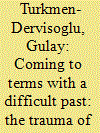

|
|
|
|
|
| Publication |
2013.
|
| Summary/Abstract |
This paper takes as its subject the question of why some nations are less willing to acknowledge past atrocities. To answer that question, it focuses on the assassination of Hrant Dink - a Turkish-Armenian journalist - and its repercussions on Turkish national identity. Scrutinising newspaper articles written before and after the assassination (2004-2007), it casts a detailed glance at the struggle between two carrier groups - pro- and anti-acknowledgement groups - and argues that the assassination increased the likelihood of the acknowledgement of the mass killing of Armenians in 1915 by creating a cultural trauma informed by collective guilt. However, the relief generated by the funeral, combined with the strength of the master commemorative narrative regarding the mass killings, decreased that likelihood, and despite the huge public reaction created by the assassination there was no attempt at acknowledgement. As such, the paper contributes to our understanding of the trauma of perpetrators and claims that, in addition to other factors listed by earlier studies, cultural trauma is a necessary but not a sufficient condition for coming to terms with difficult pasts.
|
|
|
|
|
|
|
|
|
|
|
|
|
|
|
|
| 2 |
ID:
123130
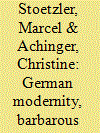

|
|
|
|
|
| Publication |
2013.
|
| Summary/Abstract |
This paper examines emblematic texts by two important protagonists of post-1848 liberalism in Germany, Gustav Freytag and Heinrich von Treitschke, focusing on their treatment of Jews and Poles. The paper analyses the social content of their statements and argues that the elements of anti-Semitism and anti-Slav racism that they contain were motivated by the specific kind of nationalist liberalism that frames their affirmation of the process of modernisation. This affirmation was directed against the Poles on the one hand, seen as backward Easterners who had to be pushed into civilisation by Prussian-German colonialism, and, on the other hand, the Jews, largely perceived as representing the wrong kind of modernity against which benign (supposedly German) modernity had to be protected. At the same time, the image of the Jew in Freytag and Treitschke also participates in that of the backward Easterner, permitting to see undesirable, allegedly Jewish aspects of modernity also as distortions resulting from an alien and ancient culture. This analysis has consequences for theorisations of both liberalism and nationalism: it suggests that the racism and anti-Semitism of nationalist liberals were intrinsically related to core aspects of the liberal world-view rather than being merely contingent opinions held by particular individuals. It also indicates that the nationalism of many German post-1848 liberals was ethnic as well as liberal. In this way, the paper contributes to the growing body of literature discussing the illiberal aspects of liberalism as well as the shortcomings of the long-established conceptual dichotomy of ethnic vs. liberal nationalism.
|
|
|
|
|
|
|
|
|
|
|
|
|
|
|
|
| 3 |
ID:
123132


|
|
|
|
|
| Publication |
2013.
|
| Summary/Abstract |
Croatian and Yugoslav national identity have been closely connected throughout the nineteenth and twentieth century. This article questions the assumption that Croatian national identification inherently opposed the Yugoslav nationalising efforts of the interwar Yugoslav state by means of a study of commemorative activities. In the commemoration of the millennial anniversary of the Croatian Kingdom in 1925, the Yugoslav level of national identity was activated as a complement to Croatian national identity. During the 1930s, commemorations of Matija Gubec and the Illyrian movement conveyed a mutually exclusive relation between Croatian and Yugoslav national identity. I argue that the dismissal of grassroots Croatian historical commemorations that were indifferent but not averse to Yugoslav nationhood in the integral Yugoslav policy of the authoritarian state during the 1930s curtailed the potential of these commemorations as vehicles for Yugoslav national identification and complicated the concurrence of Croatian and Yugoslav nationhood.
|
|
|
|
|
|
|
|
|
|
|
|
|
|
|
|
| 4 |
ID:
123133


|
|
|
|
|
| Publication |
2013.
|
| Summary/Abstract |
Scholars studying migration processes through the transnational prism have expanded the concept of 'diaspora' with a new meaning as a transnational, hybrid identity and condition, which has displaced the classical interpretation constructed around ethnicity and territory. By analyzing the activities of the Ukrainian Canadian Congress, which represents the organised Ukrainian community in Canada, an old-type diaspora, this paper argues that transnationality and hybridity have always been the inner attributes of diaspora identity and experience and stresses the importance of an essential characteristic of diaspora: the conscious effort to maintain a distinctive collective identity. Only if a community succeeds in maintaining its collective identity throughout multigenerational change can it qualify as a diaspora. These two dimensions - the self-consciousness of diaspora as a distinctive group and the survival of its distinctive identity through multigenerational change - set diasporas apart from transnational communities.
|
|
|
|
|
|
|
|
|
|
|
|
|
|
|
|
| 5 |
ID:
123128
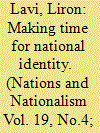

|
|
|
|
|
| Publication |
2013.
|
| Summary/Abstract |
Despite global, economic, technological and social transformations, nationality has remained an influential identity category. It still forms the basis for collective self-determination, political sovereignty and sense of belonging. This article puts forward the concept of 'Chrono-Work' to offer a critical approach to national identity. Employing temporal and performative perspectives, the concept addresses the conditions for establishing and constructing national identity. Drawing on Judith Butler's performance theory, it is suggested that performance of national acts loads national identity with meaning through the construction of a chronological narrative. To complete the theoretical picture, a case study of 'Chrono-Work' among the Jewish settlers on the Golan Heights in Israel is offered. It is shown that national identity is constantly performed through temporal strategies that aim at achieving a chronological order. Therefore, it is suggested that national identity is not given, but rather is the result of continuous 'Chrono-Work'.
|
|
|
|
|
|
|
|
|
|
|
|
|
|
|
|
| 6 |
ID:
123131


|
|
|
|
|
| Publication |
2013.
|
| Summary/Abstract |
This article examines the contending redefinitions of national identity in contemporary Germany's memorial culture, focusing particularly on the ensemble of monuments and parade fields known as the former Nazi Party rally grounds in Nuremberg. In a detailed case study, I analyse the recent conversion of one of the physical remnants of National Socialism - Albert Speer's transformer station - into a fast-food restaurant and interpret this conversion as a novel contribution to the discourse on German nationhood. I argue that the provocative commercial reutilisation of the former Nazi monument gives expression to a renewed self-confidence that Germany has gained from displaying a willingness to face up to its past as perpetrator nation. While the intervention thus deviates from the self-indicting spirit that had been characteristic for Germany's memorial culture after World War II, an ironic note is conspicuous in this act of commemorative politics that indicates a way of dealing with the fascist legacy that is, surprisingly in some respects, superior to more conventional memory strategies.
|
|
|
|
|
|
|
|
|
|
|
|
|
|
|
|
| 7 |
ID:
123126


|
|
|
|
|
| Publication |
2013.
|
| Summary/Abstract |
Theories of nationalism place native culture at the core of national self-fashioning. What explains a state's adoption of foreign objects to sustain national identity? In this paper, I argue that the incorporation of the Parthenon Marbles into British public life is an early example of supranational nationalism. The nineteenth-century 'art race' was a competitive field in which European nation-states vied for prestige. Of the thousands of art trophies that were brought to Britain from Mediterranean and North African countries, the Parthenon Marbles were uniquely iconicised. Using data from period newspapers and official documents, I assert that this was because they were assiduously presented as prenational by British authorities. In this way, they belonged simultaneously to no nation, to every nation, and to Britain. The case demonstrates the emergence of a particular form of national distinctiveness that transcended the smallness of particularity and rose to the level of universal civilisation.
|
|
|
|
|
|
|
|
|
|
|
|
|
|
|
|
| 8 |
ID:
123124
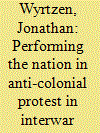

|
|
|
|
|
| Publication |
2013.
|
| Summary/Abstract |
This article applies a process approach to the study of nationalism, analysing anti-colonial protest in interwar Morocco to address how and why elite-constructed national identity resonates for larger audiences. Using Alexander's social performance model to study nationalist contention, it examines how a Muslim prayer ritual was re-purposed by Moroccan nationalists to galvanise mass protest against a French divide-and-rule colonial policy towards Moroccan Berbers that they believed threatened Morocco's ethno-religious national unity. By looking at how national identity was forged in the context of contentious performances and why certain religious (Islam) and ethnic (Arab) components were drawn on to define the Moroccan nation, this study offers a model for answering why national identity gets defined in specific ways and how the nation gains salience for broader publics as a category of collective identity.
|
|
|
|
|
|
|
|
|
|
|
|
|
|
|
|
| 9 |
ID:
123129
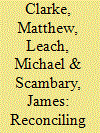

|
|
|
|
|
| Publication |
2013.
|
| Summary/Abstract |
Nation-building remains a key challenge in Vanuatu. From the origins of this new nation in 1980, it was clear that creating a unifying sense of national identity and political community from multiple languages and diverse traditional cultures would be difficult. This paper presents new survey and focus group data on attitudes to national identity among tertiary students in Vanuatu. The survey identifies areas of common attitudes towards nationalism and national identity, shared by both Anglophone and Francophone Ni-Vanuatu. However, despite the weakening ties between language of education and political affiliation over recent years, the findings suggest that there remain some key areas of strong association between socio-linguistic background, and attitudes to the nation, and national identity. These findings cast new light on the attitudes of likely future elites towards regional, ethnic, intergenerational and linguistic fault lines in Vanuatu and the challenges of building a cohesive sense of political community and national identity.
|
|
|
|
|
|
|
|
|
|
|
|
|
|
|
|
| 10 |
ID:
123125


|
|
|
|
|
| Publication |
2013.
|
| Summary/Abstract |
Nationalism theorists have noted the link between traumatic events and national identity, and cultural trauma theory presents a framework for understanding how these events become trauma narratives. I argue for greater consideration of how these narratives are strategically linked to ideological frames of national identity. A case study of post-Independence India considering the assassination of Mahatma Gandhi and the Partition of India and Pakistan demonstrates how two very different events were promoted as cultural traumas by various carrier groups in order to promote a secular vision of the Indian nation. Adapting Armstrong and Crage (2006), I suggest that the success of these trauma narratives depend on several criteria: the ease of narrating the event, how it is linked to underlying cultural meanings/frames and how the event interacts with historical contingencies.
|
|
|
|
|
|
|
|
|
|
|
|
|
|
|
|
|
|
|
|
|